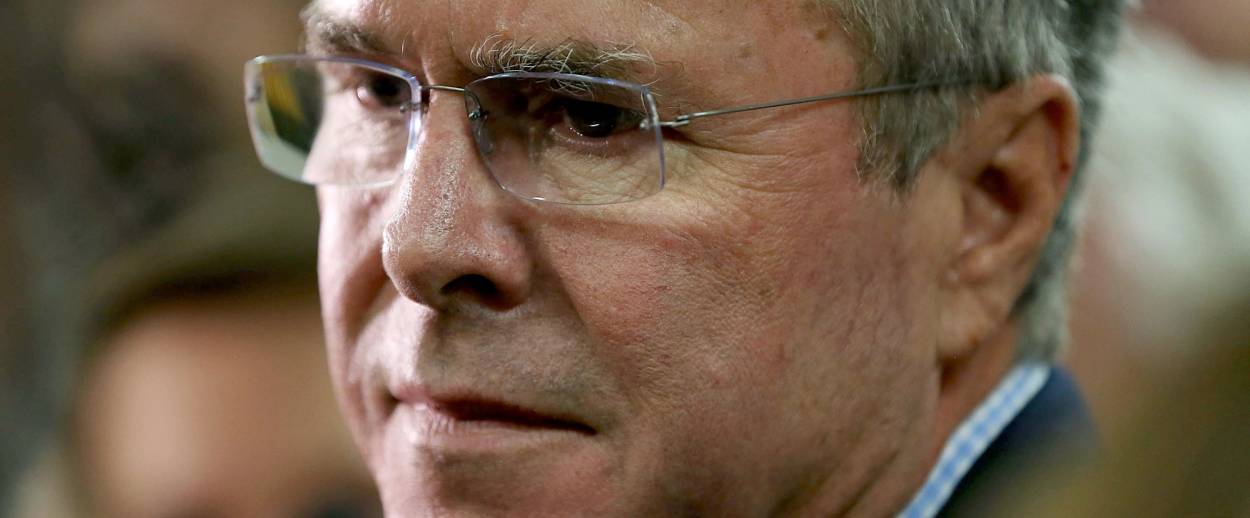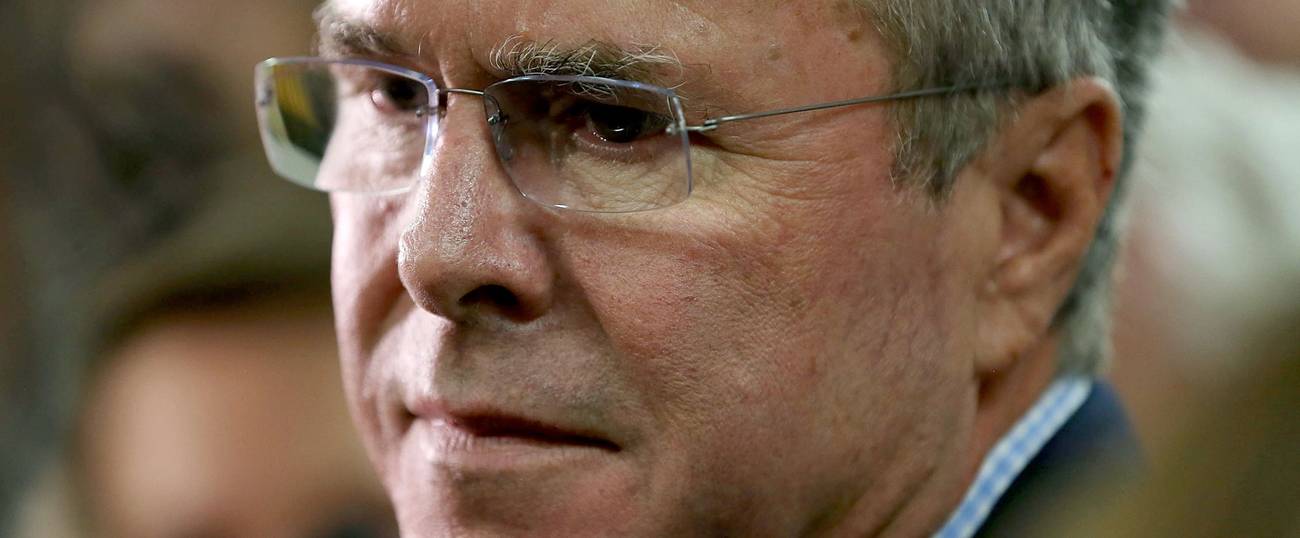Davening for Dollars: Jeb! at The Hampton Synagogue
The GOP candidate lines up to bash Obama and his Iran deal at the tony and influential congregation at the beach




“Here’s what I’ve learnt from having a front row seat to watching history unfold,” Jeb Bush told a packed congregation inside The Hampton Synagogue, which is located in the affluent confines of Westhampton Beach, New York. On both sides of the aesthetically modern, architecturally elegant building, chairs spill out from its sliding glass walls onto the synagogue’s sun-drenched, grassy courtyard and entryway, just barely accommodating the attendees at last week’s Shabbat service. “By the way,” Bush continued, “by running for president I’m not trying to break the tie between the Adams family and the Bush family.” The audience laughed. “[Being president’s] about creating highly sustained economic growth to restore America’s greatness and establishing America’s strength in a way that will create a more peaceful world.”
The Hamptons in late August remains an epicenter of wealth and power, as the elite of New York City finish the season holidaying at the luxurious seaside resort. Bush’s visit was the latest in a series to what appears to be the most desirable synagogue in America for presidential candidates. The synagogue has termed these visits its “Presidential Candidates Series,” and so far, the synagogue has hosted three of the current 17 GOP candidates: former New York Gov. George Pataki, Florida Sen. Marco Rubio, and South Carolina Sen. Lindsey Graham. According to the Jewish Insider, Rubio spoke to a packed crowd of about 700 people on the morning of Aug. 15 and reportedly received “several standing ovations” after speaking about Israel and the Iran deal. Graham participated in a Q&A session held at the synagogue that evening, telling the crowd, “I’m the biggest voice on the issues you care about.” Pataki spoke at the Shabbat service held the week before. A third Republican presidential candidate, Arkansas Gov. Mike Huckabee, is scheduled to speak at the synagogue’s Shabbat dinner this Friday evening.
In a phone interview, The Hampton Synagogue’s founding rabbi, Marc Schneier, told me that it was his vision 25 years ago for the synagogue to offer such a function. He said the synagogue pulls in “massive crowds” each week and that its congregation contains some of New York’s most influential and affluent families. (The program for last week’s Shabbat service noted that since the start of 2015, the synagogue had received several single donations of $100,000 or more.) The Orthodox synagogue, whose trustees include New York City businessman Jerry Levin and real-estate mogul Jay Podolsky, thus offers a “wonderful platform” for potential leaders to express themselves and their beliefs to those highly influential within the Jewish community. I asked what he makes of this peculiar blend of religious worship and politics. He told me about how the synagogue’s “spiritual setting” elevates the discussions and the thoughts provoked by a speaker’s presentation.
Schneier noted that both he and several members of the congregation (Schneier declined to name them) have personal relationships with many of the presidential hopefuls, and thus candidates both ask and are asked to speak at the synagogue. Specifically, Schneier said that it’s public knowledge he and Hilary Clinton are very close, and that he had a direct relationship with Donald Trump “several years ago.” As of right now, neither candidate has been booked to speak at the synagogue in the immediate future, but Schneier said, “We have next summer as well.”
Bush’s visit was announced at the end of last week, shortly after the news broke that the third member of the Bush family to run for president—his father was not particularly close to the Jewish community, while his brother George W. had plenty of Jewish fans on the right—is assembling a “National Jewish Leadership Team” as part of his campaign effort. (According to the Jewish Insider, in exchange for their endorsement of Bush’s campaign, “top Jewish leaders and donors” will be invited to a “briefing” with the candidate that will occur on Sept. 25 at Jeb’s campaign headquarters in Miami.) This was following his disastrous visit to McAllen, Texas, the previous Monday, where he went to speak publicly about immigration policy and the security of the U.S.-Mexico border, which left him defending his use of the term “anchor babies.”
Immigration was not a major topic on the agenda for Bush’s visit to The Hampton Synagogue. Security was tight. I had my bag searched on two separate occasions—my laptop was examined and the toothpaste I had brought for my brief trip to the Hamptons was sniffed—presumably to check that I wasn’t carrying some sort of minty plastic explosive. I was also ID’ed, and the security seemed baffled that someone with a driver’s license from the United Kingdom would be visiting The Hampton Synagogue. After my bag was checked for the second time and I was asked whether I carried any guns, knives, or explosives, the security guard apologized. He said, “Sorry, it’s just Europe is crazy right now. That’s probably why they hired us.”
This anxiety-provoking climate for Jews worldwide has, of course, been exacerbated by the freshly drafted Iran deal, which was a hot topic throughout the service. In between prayers, one of the first speakers asked the audience: “When Obama says we can’t get a better deal, I ask: What happened to ‘Yes we can’?” Rep. Lee Zeldin of New York, the only Jewish Republican U.S. congressman, was also in attendance and spoke while the synagogue was waiting for Bush to arrive. (Bush was scheduled to speak at 11:30, but was 40 minutes late.) Zeldin ad-libbed about the power of Congress in standing against a president’s decision—“The administration says that the deal is not based on trust but regulations, well … at least they’re admitting it’s not based on trust!”—and then told a vague anecdote about his recent “inspiring” trip to Israel where an Israeli café owner on the edge of the Sea of Galilee expressed her love for America. Midway through the service I saw one member of the congregation unbutton his shirt to show his neighbors a custom-printed T-shirt emblazoned with a picture of George W. Bush pointing to a camera on a golf course. The shirt was captioned “Miss me yet?”
The teeming synagogue was growing restless by midday. However it began to buzz when Jeb Bush eventually strode through the doors. Schneier introduced the presidential hopeful by comparing the attention to detail needed to study Torah effectively with Bush’s meticulous attention, during his tenure as governor of Florida, to frequently overlooked issues like the environment and the education system.
The presidential hopeful introduced the topic of the Iran nuclear deal by commenting on President Barack Obama’s attitude to foreign policy. He teasingly asked: “Name the countries in the world that our relationship is better since the day that Barack Obama became president,” to which the audience responded, “Iran!”
“You guys are very astute,” Bush said. “Rabbi, normally it takes 3 or 4 seconds!” Next he made his stance on the nuclear deal clear: “I am one of those who believes that with a two-thirds vote of Congress it should be rejected out of hand. No deal is better than this deal.” Bush went on to speculate on what the consequences of the deal could be:
[Obama] believes that by unilaterally conceding things the mullahs will change their ways. What they will do is take the hundreds and millions they will receive when the sanctions are released and continue to be the largest sponsor of terrorism in the world. They will continue to provide support for Hezbollah, and for Hamas, and the Yemeni rebels and for the Iraqi Shia rebels. They’ll prop up the brutal Assad regime that which has killed two hundred thousand people and created huge problems in Jordan, Turkey and Lebanon where millions and millions of people have been displaced creating human tragedies of epic proportions. That’s what they’ll do.
Bush described Obama as “dealing with the death-to-Israel crowd” and said that the current state of the United States’ relationship with the Jewish state is “tattered at the seams.” America and Israel, Bush said, are two countries that have historically “stood side by side,” ensuring the security of one another as well as stability within the Middle East. According to Bush, the Iranian threat “to wipe Israel off the face of the map” has to be taken seriously. “At some point,” he said, “we have to take our enemies at face value that when they say things they actually mean it.” He then issued a campaign promise: “If I am elected president, we will assure you that we will restore the traditional relationships that make us safe and secure.” And added: “We will make our enemies fear us a little bit.”
Jeb Bush at the Hampton Synagogue: ‘Americans don’t do pessimism well, the Germans do pessimism well.’
Throughout his remarks in the synagogue, it was clear that Bush wanted to show that strength wasn’t just a feature of his political rhetoric: He wanted to also present it as a personal trait. In a direct retort to competing GOP candidate Donald Trump’s mocking description of Jeb as a “nice guy” but a “low-energy person,” Bush shared tales from his recent stretch of campaigning in cities and towns up and down the country. In the past week, Bush had been to Texas, to Pensacola, Fla., where he “relived the hurricanes” that occurred in the city when he was serving as governor, and on Friday morning he had trained with a group of Navy Seals and their spouses in Virginia. Bush concluded: “The low-energy candidate this week has only been six days, 16 hours a day, campaigning with joy in my heart.”
And it’s this passion for “the most extraordinary country on the face of the earth,” that Bush considered to be at the heart of his campaign. “For the first time in American history,” he explained, “we are deeply pessimistic. Americans don’t do pessimism well, the Germans do pessimism well,” Bush quipped, receiving a few awkward laughs. “We do better when we embrace the unforeseen and unknown, when we don’t think things are falling apart at the seams. But that requires political leadership to be able to bring people together.”
Bush criticized Obama for his unwillingness to accept American exceptionalism: “I don’t ascribe bad motives to the president but I believe that his feeling the United States is not a force for good but a cause for problems in the world is just wrong.” He concluded his speech to the sound of polite applause, emphatically explaining, “I want to spread this joy and love of country so that people can start to believe in America.” The next stop on his journey, he announced, was North Carolina.
Bush swiftly left the synagogue, and the congregation began to stampede toward the courtyard where a lavish kiddush lunch was served. The congregants mingled and gossiped together about the past weeks over full plates of chicken, breads, fruits, and a variety of different cakes. As the congregants gradually started to disperse, I spotted the man with the George W. Bush T-shirt, now with his Oxford shirt fully unbuttoned, discussing Bush’s speech with two friends.
“He did the right thing,” I overheard him conclude, before saying goodbye to his friends, humming as he walked off, down one of sunny Westhampton’s leafy streets.
***
Like this article? Sign up for our Daily Digest to get Tablet Magazine’s new content in your inbox each morning.
Jas Chana is a former intern at Tablet.